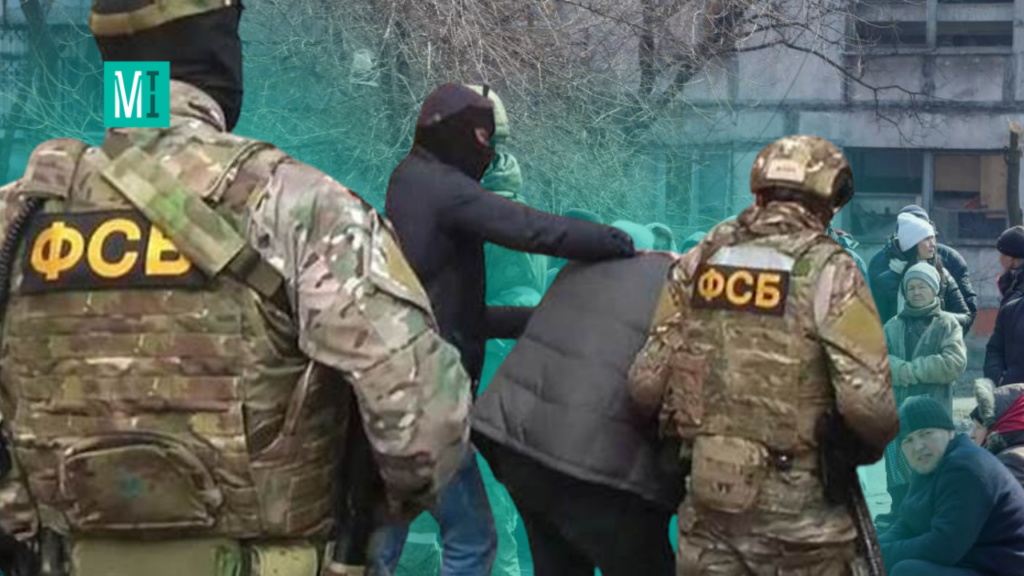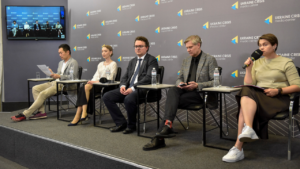Russia’s persecution of civilian Ukrainians may be a crime against humanity — OSCE reveals new facts

The OSCE has presented a report on violations and abuses of international humanitarian and human rights law, war crimes, and crimes against humanity related to the arbitrary deprivation of liberty of civilian Ukrainians by the Russian Federation. The report was prepared by a mission of OSCE experts within the framework of the Moscow Mechanism, the launch of which the Media Initiative for Human Rights has been advocating for more than a year and a half. During the preparation of the document, the MIHR worked closely with the mission’s experts, with facts about Russia’s crimes documented by us becoming part of the report.
In particular, it emphasizes that arbitrary detentions of Ukrainians by the Russian authorities have been ongoing since the annexation of the Autonomous Republic of Crimea in 2014 and the establishment of the Russian-controlled quasi-entities “LDPR” (so-called Luhansk and Donetsk People’s Republics) in the ORDLO (Separate areas of Donetsk and Luhansk regions). In 2022, Russia expanded this practice to the newly occupied territories of Ukraine.
The authors of the report emphasize that Russia has illegally detained thousands of Ukrainian civilians, cutting them off from the outside world, including from communication with their families. Very often, civilian prisoners are subjected to torture and other abuse, including sexual violence. The Russian authorities also deny arbitrarily detained Ukrainian civilians access to lawyers and deprive them of the right to a fair trial.
A large section of the report is devoted to the documented facts of extrajudicial killings of civilian Ukrainians held by Russia in detention centers. The experts are convinced that this is “a serious violation of International Human Rights Law and International Humanitarian Law and may constitute a war crime and a crime against humanity.”
It is also emphasized that the practice of detention of civilian Ukrainians by Russia is systematic, arbitrary, and illegal. It has become widespread and “has signs of systematic, consistent, purposeful actions aimed specifically at Ukrainian civilians.” All this, the mission members note, may constitute war crimes or crimes against humanity.
According to the US Mission to the OSCE, during the presentation of the report to the OSCE participating states, it was stated that arbitrary detentions are not isolated cases, they are not limited to a few civilians and are not the responsibility of any individual Russian soldiers. Instead, there are reasonable assumptions that Russia’s arbitrary detention, transfer, deportation, inhuman treatment, torture, and extrajudicial killings of Ukrainian civilians are an integral part of its war strategy. One of the proofs of this is the fact that the Russian authorities primarily target local officials, teachers, human rights activists, and journalists. That is authoritative leaders of Ukrainian communities. By eliminating them, Russia instills fear in the rest of the population, eliminates civic activists who speak the truth and forces the rest to remain silent.
In addition to the closed presentation of the report to OSCE participating states, the recommendations developed by its authors were discussed publicly. The event took place at the OSCE headquarters in Hofburg, Vienna. Two Ukrainian organizations — MIHR and CrimeaSOS — were invited to join the discussion. Lyubov Smachylo spoke about the work that the MIHR`s documenters and analysts do daily to document Russia’s crimes. At the same time, she emphasized that the international community should be prepared that the report’s publication is not a solution to the problems identified in it but rather the beginning of a long path to release people from places of illegal detention and further prosecution of the perpetrators.
The report’s authors agreed with this statement, noting that the path will indeed be difficult, as Russia doesn’t respond to any inquiries and doesn’t react to the international community’s comments and condemnation of its actions. The experts also thanked Ukrainian CSOs that professionally documented the crimes committed by Russian representatives and actively provided evidence and information for the report. The special mail created for this report received more than 80 letters with information about Russian crimes against Ukrainian civilians, which is significantly more than during the writing of previous reports.
VANISHED UNDER OCCUPATION: Where Russia Is Holding Ukrainian Captives
This is the fourth report prepared under the Moscow Mechanism procedure. The first two concerned the general situation in Ukraine, the third was about the deportation of children, and now the fourth one is about civilians.
The full report is available here.








